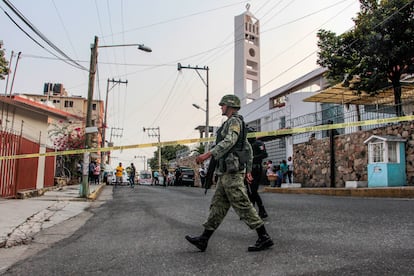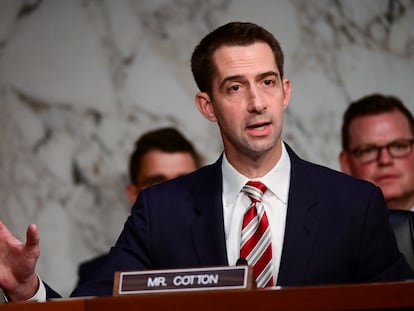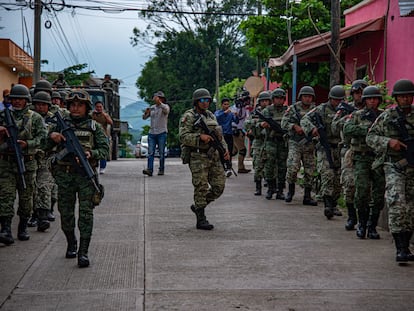Greed, ambition, money and power: Mexican bishops negotiate with drug traffickers in Guerrero
The clergy has been attempting to settle differences between La Familia Michoacana and rivals Los Tlacos after a successful truce between the latter and Los Ardillos over transport routes


In mid-January, the four bishops of the state of Guerrero met in Ciudad Altamirano, in the Tierra Caliente region, seat of the diocese of Monsignor Joel Ocampo. As every year, they gathered for a pastoral meeting with other clergy to share ideas and air their problems. But the meeting had another objective: to engage in face-to-face dialogue with the leaders of the organized crime group La Familia Michoacana — Johnny Hurtado Olascoaga, alias “El Pez,” and his brother, Alfredo, alias “La Fresa” — to try to lay the groundwork for a truce with an opposing criminal organization, Los Tlacos, who dominate part of the central region and the highlands of Guerrero. Despite the attempt, they failed.
The frustrated negotiation in Tierra Caliente contrasts with the agreement reached in the capital for Los Tlacos and another criminal group with interests in the area, Los Ardillos, to stop fighting over local transport routes, a situation confirmed by the priest Filiberto Velázquez, of the diocese of Chilpancingo-Chilapa. Asked about this matter, President Andrés Manuel López Obrador said Thursday: “Priests and pastors and members of all the churches have participated, helped in pacifying the country. I think it is very good.” However, the president warned, the government would not approve of “any agreement that meant granting impunity, privileges, or licenses to steal.”
As the bishop of Chilpancingo, José de Jesús González, explained Wednesday, the negotiation between Los Tlacos and La Familia Michoacana failed because of “greed, the ambition to have money and power” among the leaders of both factions. González did not elaborate. “[The bishops] asked for a truce, with their conditions, but those conditions were not to the liking of any of the participants. It was a question of territories, which they do not let go of. It has cost them work, lives, and they won’t relinquish them. So, we have to look for other ways to address this situation,” he said.
Sources close to these negotiations consulted by EL PAÍS explain that the mid-January meeting, the culmination of a series of smaller meetings, took place “beyond Arcelia,” also in Tierra Caliente, the territory of La Familia Michoacana. The bishops first spoke with El Pez and La Fresa, and then called the leader of the opposing group, Onésimo Marquina, alias “Necho,” who was in the mountains of Tlacotepec with a priest he trusted, according to these sources.
Apparently, the conversation did not bear fruit. The same sources said that the negotiation failed because La Familia Michoacana and Los Tlacos did not agree on various points. “La Familia wanted Necho to cede Las Tunas to them, a community that is part of San Miguel Totolapan, but very close to Heliodoro Castillo,” explains one of the sources. The municipality of Heliodoro Castillo is the base of Los Tlacos, while San Miguel Totolapan is part of La Familia’s domain.
The disagreement extended to other issues. “They also did not agree on the distribution of Iguala, because La Familia wants half, and right now it belongs to Los Tlacos with other groups. And the same thing happened with Taxco. Necho agreed to cede the municipality and promised not to get involved in the fight for Morelos,” explains this source.
One of the four bishops pointed out after the meeting that he had noticed more openness on the side of La Familia and, on the side of Los Tlacos, more reticence. During the meeting, the four bishops emphasized two points to the criminal leaders: first, that their disagreements should not affect the population. Second, that the weight of their extortion on the public was reaching a critical point.
Sign up for our weekly newsletter to get more English-language news coverage from EL PAÍS USA Edition









































